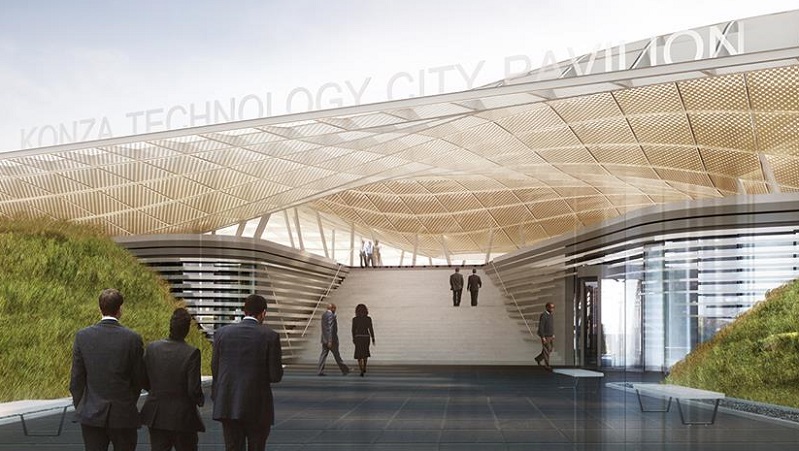MTN South Africa has once again emerged as the country’s top-performing mobile network, securing the highest score in the Q2 2025 MyBroadband Network Quality…
Konza City headquarters expected to be completed by December says agency head

The headquarters for Kenya’s Konza Techno City is just months from completion, Konza Technopolis Development Authority (KoTDA) CEO Eng John Tanui revealed yesterday.
Critics in Kenya have regularly bemoaned the initiative — which is expected to cost $14.5-billion, take 10 to 20 years to be fully operational and has been dubbed “Silicon Savannah” — as slow to get off the ground.
In an email Tanui told Ventureburn that construction on the nine-storey headquarters is 90% complete and is expected to be completed by December.
The building will host the agency’s staff and provide office space for anchor tenants, investors and the innovation community.
Construction of Konza City’s nine-storey headquarters is 90% complete and is expected to be completed by December
Once complete the building will also contain a conference facility which will host a model Huduma Service Centre and Smart City Exhibition Spaces for local and international partners. It will also contain a hotel block to provide accommodation to the city’s anchor tenants, investors and visitors.
Last year the authority awarded a 40 billion Kenyan shillings contract to Italian company Impresa Construzioni Guiseppe Maltauro (ICM) to among other things design, finance and build new roads and put in place storm-water drainage, water and sewerage systems and an electricity network.
Tanui said construction commenced on 3 August and is expected to be completed in 42 months (by this reckoning, by beginning of 2022).
The authority recently opened another request for proposal period that will run until 30 June 2019 for investors to submit their proposals for the projects that will be undertaken on one or more of the over 73 parcels of land currently on offer.
The authority has also issued a letter of offer to certain investors drawn from the public sector and private sector. These include among others, the government’s construction and electricity authorities for a training facility and substation, respectively.
They also include Craft Silicon, a global software company, to construct offices in Konza Technopolis to house their research and development departments as well as a data centre where all their clients globally will be hosted.
The Makueni County aka Housing Cooperative Society has been asked to set up a headquarters for the cooperative and Nova Pioneer Education Group to launch three schools in Konza Technopolis.
University not yet in design phase
In May last year Tanui told Ventureburn that the construction of the Korean Advanced Institute of Science and Technology (Kaist) is likely be completed by the end of 2019, with the first intake of students to begin in 2020.
Read more: Architect of Kenya’s Silicon Savannah hits out at delays at Konza Techno City
Tanui said the financing agreement was signed in December last year and that the procurement of design consultants for curriculum and for an architectural design consultant is ongoing.
“The project will take 39 months from when the procurement of design consultants begins to the launch of the project. The procurement of the design consultant began in June 2018,” he added.
Tanui’s comments yesterday follow an increase of 400 million Kenyan shillings ($4-million) by the government of Konza City’s budget for the year to end June 2019 — to 8.3 billion Kenyan shillings ($82.3 million).
He said the additional budgetary commitments “will go a long way” in financing infrastructure including roads, sewage, power, drinking water public parks and the completion of the first building.
“The allocation was justified by the need to accelerate implementation of Phase 1 of Konza Technopolis, a project intended to make Kenya the technology hub in Africa and contribute two percent to the country’s GDP,” he added.
Tanui said while the initial project was estimated at $14.5-billion in 2009 when the project was in the process of being conceptualised, with changes in inflation rates and the current cost of investments, this is expected to have escalated.
Commenting on transport links to the development, he said Konza is already linked to the A109 highway connecting Nairobi with Mombasa, while the mainline Konza rail station is less than 4km away and Jomo Kenyatta airport is less than 50km away.
‘Pessimistic timeline’
However, commenting on progress, independent researcher and former lead at m:lab in Nairobi John Kieti was more cautious.
“If I were to attempt a guess, it will be a pessimistic timeline knowing how troublesome government executed real estate projects are,” he added.
Said Kieti: “For entrepreneurs to start working out of the new premises, they will need to have figured out accommodation or transport logistics and operational details of the entrepreneurship development programme to be linked to Konza. I would give it at least one more year for these details to be figured out and for implementation to start.”
Will this catapult Kenya into an entrepreneurial leader on the continent? Only time will tell.
Featured image: An artist’s impression of the pavilion entrance at Konza City (via Facebook)

